
Are the woes of some TV presenters more newsworthy than others’?

A national television news presenter is accused of paying thousands of pounds for sexually explicit pictures. He is not named. The story makes the lead for the Sun for a whole week, the rest of Fleet Street piles in. The BBC suspends the presenter and devotes half of its main evening news bulletin to the subject for three successive nights. The Prime Minister says these are serious allegations that must be fully and thoroughly investigated.
A national television news presenter is accused of offering thousands of pounds for sexually explicit pictures. He is named by Byline Times, which says it has conducted a three-year investigation into allegations against the presenter. The story makes a page lead for the Mirror and the Star. The Guardian and i also report it, but as a secondary story to the latest on the BBC presenter. He is not suspended by his news channel, but is rather given six minutes at the start of his nightly show in which to deny the claims and to assert that “dark forces” are trying to shut down the network.
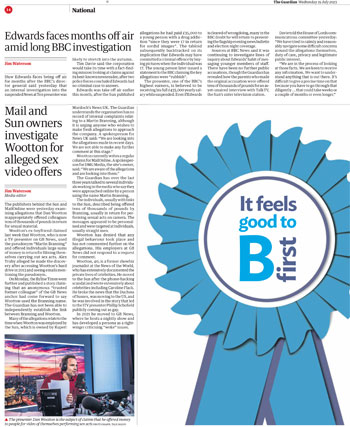
The Prime Minister does not venture an opinion on whether these serious allegations should be fully or thoroughly investigated, but former minister Dame Andrea Jenkyns commends the presenter’s “brave, heartfelt and powerful speech”, attacks “the left” and “political cancel culture” and assures him, “We have your back”. A slew of newspaper columnists take to Twitter to say, “I know nothing about this, but he’s always been a very nice person.”
Byline Times is not the first outlet to look into Dan Wootton’s past. Private Eye has been there, the Guardian is working on it. Besides the “catfishing” claims, there have been allegations of bullying and of victims being paid off and having to sign non-disclosure agreements. On Monday evening, Byline came back with episode three of its investigation, focusing on one man’s ten-year experience of coercive control at the hands of “Martin Branning”, which it claims was the presenter’s alias. Wootton has so far declined to confirm or deny whether he ever used that name.
When the Huw Edwards story was bubbling, former Sun editor Kelvin MacKenzie was demanding to know why the BBC had not acted earlier, saying it had known about certain behaviours “forever”. Wootton used to work for the Sun and many of the allegations being published now relate to his time there. MacKenzie’s Twitter account is strangely silent on the need for his former employer to account for itself.
MPs have, however, spoken up. On Monday, the chairman of the culture committee wrote to Victoria Newton asking for enlightenment on its news assessment and verification procedures, with regard to the Edwards scoop, and what it was doing about the Wootton allegations. Newton responded promptly and News UK had already commissioned lawyers to examine the Wootton claims. The Mail, for which Wootton writes an online column (although none has appeared since Byline Times started publishing its allegations), is also taking a further look. In the meantime, The Sun and Times have reported the presenter’s admission of past “errors of judgment” and how he has learned lessons. The Mail has published not a word.
By any measure, this is a story. Yet no one in my media-savvy family was aware of it; most of the mainstream is wilfully ignoring it. Caution for fear of libel litigation or breach of privacy is understandable, but if the will is there, there are ways to tell at least part of the story. There was no such reticence when Huw Edwards or Phillip Schofield were in the firing line. As Alan Rusbridger noted in a tweet seen by 1.3m people, the silence in this case seems “a little unusual”.
Now, I wouldn’t advocate any newspaper rushing into print with allegations that could harm anyone’s health, family or career (a) without very good reason and (b) without being pretty sure of their ground. Newspapers are supposed to be founts of reliable information, not rumour. So, caution with regard to the Wootton allegations may have been the wisest counsel. Except for the fact that every media outlet jumped on the Edwards bandwagon on the strength of what another newspaper had written based on the word of two anonymous people.
Add to that the fact that the “victims” in the Edwards and Schofield stories did not see themselves as such and the “young person” whose parents went to the Sun about Edwards specifically said the claims were untrue and that he did not want to pursue any complaint. In the Wootton case, alleged victims have come out with chapter and verse, putting their names in the public domain – one had posted a long Twitter thread giving his side of the story a week before Byline Times published anything – so any other news organisation inclined to follow up this latest “TV presenter sex scandal” could have got on to it. They chose not to.
The worry is that this isn’t, to borrow Rusbridger’s ironic words, “a little unusual”. It is a stark demonstration of so much that is wrong with our media (the BBC, which so happily donned the hairshirt for Edwards, hasn’t reported Wootton’s travails either) but, particularly, the Press.
As with supermarkets and banks, having a number of different titles is supposed to stimulate competition and give customers better value. But it doesn’t always work like that. Ministers are frustrated with banks for failing to pass on higher interest rates to savers; ministers are frustrated with supermarkets because their petrol prices don’t seem to be coming down as fast as the wholesale market would suggest. There are hints that, rather than competing, they may be working in concert. Like a cartel.
The same could be said for newspapers – but in this case, rather than a price-fixing cartel, it feels like an ideological cartel. The big hitters all have the same outlook on what they see as the key issues of the day (not necessarily the ones their readers most care about): migration, cancel culture, the folly of the “race to net zero”, gender wars. They thump these tubs so loudly that they pervade every area of public debate and drown out voices trying to raise other concerns.
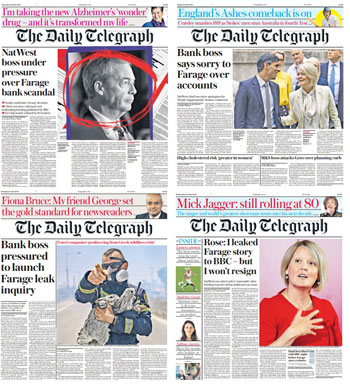
Most members of this club loathe the BBC as an “unfair” competitor. GB News is not only no threat, but also shares the same outlook as many rightwing titles. So, instead of telling readers about serious allegations against one of its presenters, they hyperventilate about another of its presenters being denied a posh bank account.
Because this is cancel culture gone mad and if Nigel Farage can be sacked by his bank because of his political views, so can any one of us. Except, of course, most of us don’t qualify for an account with Coutts to start with, and most of us don’t have his sort of visibility to dent (or enhance) its reputation. Nor do most of us with accounts with the usual used-to-be-high street lenders broadcast who we bank with as some kind of badge of honour. If Farage had been dumped by TSB, it might have merited a smidgeon of the confected outrage we’ve seen this past week. But if he had banked with TSB, he would never have told the world about it.
Then, of course, because Simon Jack was fed only part of the bank’s defence by a “trusted” source, the BBC came under fire from all sides and apologies were being demanded. Jack duly apologised to Farage. If only newspapers were as quick and as public in admitting it when they’ve got something wrong.
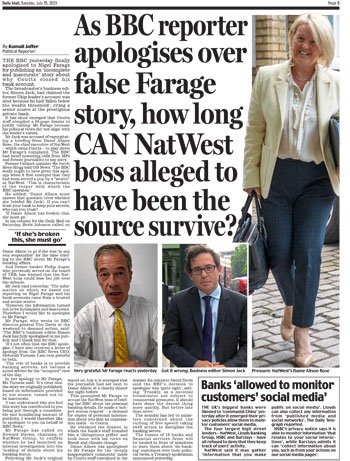
And was that the end of the matter? Oh no. On Tuesday the Mail puff demanded: “As BBC reporter apologises over false Farage story, how long CAN NatWest boss alleged to be the source survive?” This was not a pointer to an opinion piece, but to the news pages – where the headline was virtually replicated. So much for keeping fact and commentary separate.
What message did this send anyone who might be tempted to give a Mail journalist an off-the-record briefing – or even just a tip – on a developing story? Isn’t a journalist’s rule number one to protect sources at all costs? Yet, here we have a newspaper first attacking the journalist, then exposing and demanding the resignation of his suspected source. All those “friends” of Boris and the royals must be quaking in their boots.
To be fair, by this time it was pretty clear that Dame Alison Rose was likely the source – she had sat next to Jack at a charity dinner the night before he broadcast his take on the Farage affair. Also, to be fair, she clearly had no business peddling half-truths about her clients. The argument “if they can dump Farage for his views, they could dump any of us” may be spurious, but we still don’t want our bankers talking about our affairs over the dinner table. Especially not to journalists.

By Tuesday evening, Rose had come clean; the bank board expressed its full confidence in her, and the story was raging out of control. Yesterday, the Express played catch-up, splashing on the same “how can she survive?” line as its rival’s puff from the previous day. How embarrassing is that? Meanwhile the Times was leading on No 10 wanting her to quit. Not just No 10, it seems. No 11 and a lot of the cabinet too.
Hang on a minute. They can dress it up in “concerns for the stability and trustworthiness of the banking system” all they like, but it is really not for the government to be seeking to influence the running of an independent commercial enterprise. If I were a NatWest director, even if I had thought before that Rose should go, I’d have been doing my damndest to make sure she stayed in position just to show Sunak that he needed to keep his nose out.
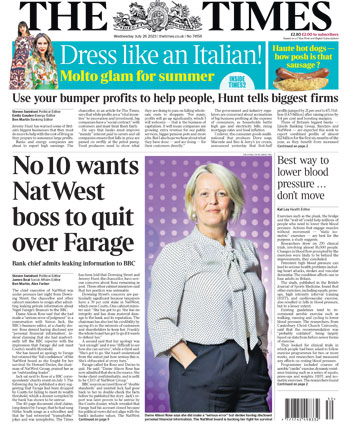
But by the time the papers hit the streets yesterday, she had gone. Of course, her position was untenable. It was an unconscionable breach of client confidence. But for newspapers who rely on the indiscretions of those “in the know” to be clamouring for the head of a journalistic source was a bit rich.
Byline Times
In his six-minute self-defence, Wootton dismissed Byline Times “a hard-left blog”.
Leaving aside the (unjustified) political dig, many in the mainstream might wish it were only that. Blogs tend to be the thoughts of an individual. Byline Times certainly publishes the thoughts of individuals. As does every Fleet Street newspaper (they call them columnists). And like every Fleet Street newspaper, it also employs journalists to write news stories and conduct investigations. Its main presence is online – it has about 30,000 subscribers, putting it in the same league as respected old-school news magazines – but it also publishes a print edition, which is posted out to readers. That currently sells about 15,000 (about the same as the Liverpool Echo) and should grow in the autumn when it becomes available in shops.
A bit more than a blog.
How two footballers’ acquittals were reported...

Favoured TV presenters aside, newspapers are invariably more interested in reporting allegations than in the ultimate conclusions as to whether they were justified. Oh yes, the denouement is covered, but rarely with the gusto of the initial story – especially if the initial claims are shown to be false.
We see it all the time with court reporting: the arrest and charges are big news if the defendant is a celebrity of some kind; the opening of the prosecution is run in detail. Then interest wanes unless there is a star witness giving evidence (star in the sense of celebrity rather than the quality of the testimony). Defence coverage is usually limited to anything the defendant says from the witness box, then comes a couple of hundred words on the summings up and next thing you know, the jury’s back. It often comes as a shock to find that the personality who was ripped to shreds on page one a few weeks ago has been acquitted.
There have been two such cases in the past fortnight. First the former Manchester City defender Benjamin Mendy was cleared of rape and attempted rape, then Ryan Giggs was discharged on charges of assaulting a former girlfriend. Both had been through two trials.
Mendy had initially faced seven rape charges, plus one of attempted rape and one of sexual assault. From the court reports of the first trial – which lasted five months – he sounded like an entitled, arrogant monster, hosting debauched parties at his “mansion” home, bragging of 10,000 conquests. Yet at the end of it, the jury acquitted him of all but one of the rape charges and the sex assault. They couldn’t agree on those, were discharged, and the prosecution immediately announced that it would seek a retrial, with a date set for last month.
The press approach to this outcome was, shall we say, diverse. The Telegraph had a page lead saying, “Mendy walks free after sex attack case but faces retrial”. All that space, but not enough to say that he’d been cleared of most of the charges? I’d agree that this was a “but” sort of story, but in the way the Guardian and Express had it, with variations on “Not guilty on six charges, but faces retrial…”

I guess that if you wanted to suggest “the player’s ordeal goes on” the retrial line, which was preferred by the Sun, Times and Mirror, was newsier. But I didn’t get that vibe from the Sun’s copy, which was heavily laden with the prosecution’s claims that he was a predator. So a jury that had given the matter a huge amount of consideration – 67 hours over 19 days – after four months of evidence had concluded that most of the charges were unproven. But the reader is still left with the impression that here is a monster.
The second jury took just three hours to acquit Mendy of the remaining two charges. The Sun, to its credit, put the verdict on its front page (not the splash – come on, the Spice Girls were reuniting), as did the Telegraph. For most, it was an inside page lead with a bit of the expected relief and rebuilding his life.

Compare and contrast this with the Giggs coverage. Again, the evidence presented to readers appeared damning. And there was much more of it, Giggs being a more high-profile figure and better known to people who don’t follow football closely.

In this case, he was accused of attacking and controlling his ex-girlfriend and of assaulting her sister. The jury spent 23 hours considering their verdict before telling the judge that there was no prospect of their agreeing. This made the splash and a spread for the Sun and a puff and a page lead for the Mirror (“Giggs awaits his fate”).
Last week the CPS announced that it would not be proceeding with a second trial. This, too, made the splash and a spread for the Sun – “Giggs I want my career back” on the front, “Ryan’s relief” inside – and a spread for the Mirror, “Giggs bid to restart career”. The Telegraph and Guardian also focused on the relief, the Times on his not facing a retrial. Quite right, too. He was obviously relieved not to have to go through another trial; naturally he wanted to restart his life.
Now let’s look again at the secondary heads in the redtops: “Footie legend cleared” for the Sun and “Football ace cleared of assaults” in the Mirror. Was that quite fair? You might say “in the clear”, but no jury has concluded that he never headbutted his girlfriend. The CPS dropped charges because she said she couldn’t face giving evidence again. It is perfectly possible that a second jury would have dismissed the charges as swiftly as the second panel did for Mendy. But that didn’t happen. You could say that Giggs was denied a further chance to clear his name.
Rape and domestic abuse are abhorrent. If these men were half as nasty as the prosecutors told the courts, they have got away with horrible crimes. If they were stitched up by chancers or vindictive women, they have suffered terrible smears on their characters. It is not for newspapers (or media commentators) to speculate on which applies in each case. But I do find an uncomfortable imbalance between the treatment of the two players, particularly in the sympathetic coverage of Mr Giggs.
... and one actor’s

And then there was Kevin Spacey. He was cleared of all sex charges against him at Southwark Crown Court yesterday, making most of this morning’s front pages in some form or other. Unfortunately for both of them, he was trumped by the death of Sinead O’Connor. This meant he was consigned to the puff for most of the tabs, which might otherwise have led on the acquittal. Setting aside the obvious headline in the Star, Sun and Mirror (it wouldn’t feel so hackneyed if they actually believed it), there were some handsome pages – particularly Metro and the Mirror.
The outliers here were the Telegraph, which had Spacey as its main image with O’Connor nowhere on the front, and the Guardian, whose first mention of Spacey was on page 10. Nor did either of the whitetops have page one space for the actor being cleared. The Express thought Esther Rantzen blaming asbestos in BBC buildings for her cancer a better bet.
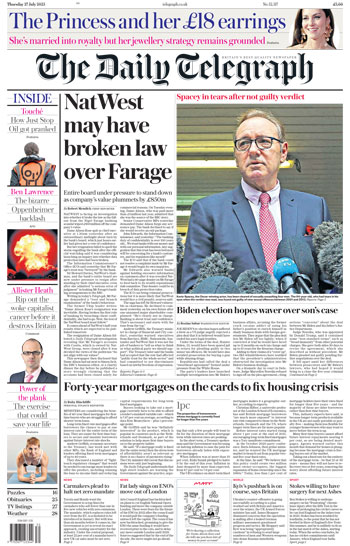
Full of sound and fury
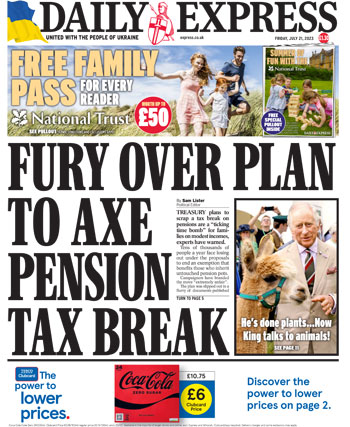
A couple of Saturdays ago, the Times led on Rishi Sunak wanting to abolish inheritance tax “in a bid for votes”. This seemed to me a rather strange pitch, given how few people pay it – and then only the wealthiest in society. But, hey, if you want to secure your core voters, each to his own.
But this plan had a knock-on effect, leading to the Express screaming “Fury over plan to axe pension tax break” in its splash a few days later. If you’re going to abolish IHT, you have to make the money up somewhere and one possibility apparently being considered is to end an exemption for some people who inherit unopened pension pots. This emerged from the mass of documents released in the “taking out the trash” operation at the end of the parliamentary session.
It seems that if you die before you are 75 and you haven’t touched your pension, you can pass the whole lot on without your heirs having to pay income tax on the money. If you kick the bucket after that, the fund is taxable whether you’ve dipped into it or not. I found all that quite interesting, though not remotely relevant to me or to most people, I’d have thought.
The thing that got me going was the use of the word “fury” in the headline. For there was none in the copy. A consultant (didn’t say what sort of consultant, but I imagine a financial one rather than a medical one) described it as a “ticking time bomb” and a couple of people said it seemed “unfair”. But no one was furious.
Because they so rarely are. Yet it’s such a convenient headline word. In the last two weeks, it has appeared in headlines in the four best-selling tabloids 30 times. The Sun led the field with 12, the Mail – usually the most apoplectic of papers – brought up the rear with three. And one of those was genuine fury – that of a husband who was so incensed by his wife taking a lover that he killed her and then himself.
All but the Sun reported fury over the EU referring to the Falklands as the Malvinas, two reported fury over Keir Starmer backtracking on the child benefit cap (a lot of people were quite cross about that). After that, the causes of outrage were many and various – from limos for people going to a Nicola Sturgeon party to spectators taking selfies at the Tour de France. There was fury over university trees being cut down, at the sale of the cab of the truck in which 39 migrants suffocated, at a footballer going to Saudi Arabia. There was more fury over solar panels and gas boilers, the asylum-seekers’ barge, the eviction of a D-Day veteran and nurses’ pay. The Mirror’s eight contributions included a judge who was furious that he had to jail a woman, while the Express’s tally of nine encompassed people being very upset that an economy prize had yet to be awarded.
Isn’t it time we all calmed down a bit?
Carlos who?
But we do love a royal. It’s become a mania. It’s one thing when the Queen dies or there’s a wedding or coronation, but the Sunday before last, the Mail on Sunday gave its entire front page over to Prince George and his mum. Splash, puff and picture. He wouldn’t have to go into the Forces if he didn’t want to, he was having a birthday, and Kate was hugging Ons Jabeur after she lost the Wimbledon ladies’ final.
The Sun was almost as bad, with birthday boy George in the puff and a splash on his dad having a scooter. For heaven’s sake. Was nothing real happening anywhere in the world?
Well, yes, apparently so. The Sun gave a tiny corner to a woman saying she had been raped – and still found space for its £9.50 hols promo.

That afternoon, for the first time in 21 years, a player not called Nadal, Djokovic, Federer or Murray won the men’s singles championship. So shall we introduce our readers to 20-year-old Carlos Alcaraz? No. Here are Charlotte and George roaring in the Mirror. And here’s Kate standing ready to hand over the trophy in the Sun (with a tiny insert pic of the man of the moment).
I give up.
A numbers game

It’s a sweeping generalisation, but journalists are often not that hot on numbers. Sometimes they simply don’t understand them, at others, they use selected figures to impress or perhaps bamboozle readers.
Let’s start with the Sunday Express’s celebration of Britain’s entry into an Indo-Pacific trading bloc. This, it said, was a £12 trillion Brexit trade boost. Now a reasonable person might take that to mean that the deal was worth £12 trillion to the UK, possibly over a long period of time. It isn’t. Indeed, the figure is not explained beyond the intro which talks of a “£12 trillion trade bloc”. What does that mean? Well, actually, it means that the combined GDP of the members adds up to £12 trillion, so it’s a measure of the size of their economies and has nothing to do with their – or our – trading figures. But readers weren’t told that.
Readers were told that the bloc has a combined population of about 500 million and that it accounts for 15% of global GDP. By coincidence, the EU has a combined population of 468 million and accounts for 15% of global GDP. Readers weren’t told that either.
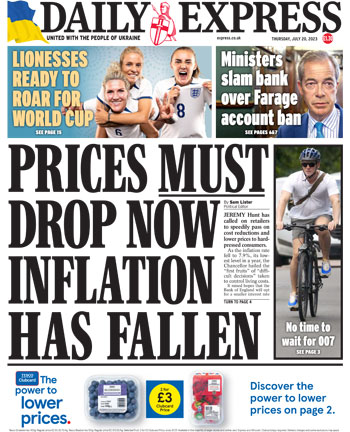
But for economic illiteracy, this – albeit courtesy of the Chancellor, which makes it seriously worrying – takes the biscuit.
Simple lesson: when prices go up, it’s called inflation. If the inflation rate falls from, say, 10% to 9%, prices are still going up, though less fast. Prices are the driver here. They are what cause the inflation rate to rise or fall, not the other way about.
Now, as it happens, prices at the factory gate did actually fall in the year to June. That is what might make goods in the shops cheaper. But the fact that most things are getting more expensive less quickly won’t.
The i also leapt on the latest inflation figures, which wasn’t surprising, given its obsession with the cost of mortgages. But its splash was bizarre. Far too heavy on detail, yet without clear information. Given its history, the headline “Interest rate hike to 5.25% in two weeks forecast” sounded like another gloom warning. In fact, this is a lower rate than had been expected, so it was sort of good news for its readership. But whatever the meaning, I think the “in two weeks” kills that headline stone dead.
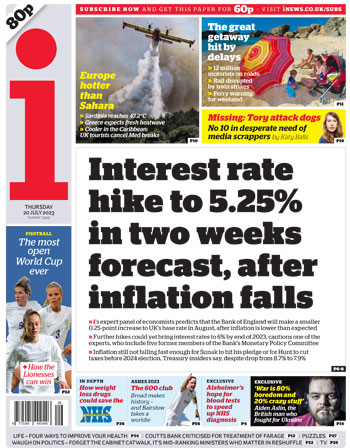
Meanwhile, for some perspective on the cost of living, try the FT, whose inside story reported that our inflation rate is the highest in the G7, the third highest among OECD “advanced countries”, and that food inflation here is three times as high as in America.
But let’s cling to the hope that things are getting better.
Europe in flames: cause & effect
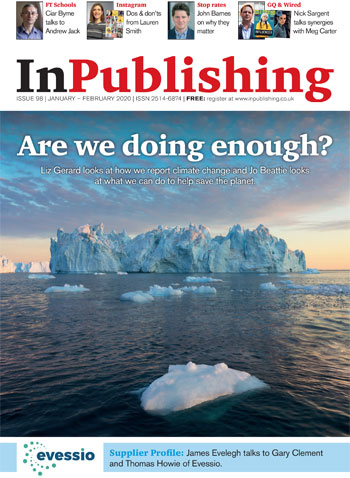
Not in Greece they’re not.
Three years ago, I wrote a piece for InPublishing magazine about the way the Press covers climate change. Essentially it concluded that we weren’t doing a good job. At the time, Rupert Murdoch’s Australian had been roundly criticised for its coverage of the wildfires in New South Wales and I recalled a carpeting I’d had at the Times a decade or so earlier over a splash intro rewrite that had injected the assumption that global warming was man-made. Staffers there had, however, detected a change in attitude under John Witherow. “There was definitely a feeling that we were cautiously sceptical. Now we are very greeny indeed,” my spy told me.
Well, it didn’t look that way on Monday. In common with other Tory-leaning papers, The Times was focused on Sunak’s reported retreat from what he believes to be unpopular eco policies. In this he was spurred on by the Tory by-election win in Uxbridge, which was put down to the planned extension of London’s ultra-low emissions zone (Ulez) to encompass Boris Johnson’s old constituency.
Ulez was introduced by Johnson himself when mayor and the expansion was indirectly endorsed by the government in 2021, when transport secretary Grant Shapps told Sadiq Khan that if he retreated on that policy, he should expect no help from Whitehall to make up the income shortfall.
Be that as it may, the Uxbridge victory was seen by the climate-sceptic Press as proof that eco-friendly policies (like the eco-maniacs and eco-warriors and eco-mob) were unpopular and gave them the green light (oops!) to push for further watering down.
That this should all take centre stage against a backdrop of the wildfires in Greece was unfortunate, to put it mildly. For the previous two weeks, the foreign pages had been reporting on the heatwave in southern Europe. Then the fires broke out in Rhodes. Then the British press woke up to the fact that this was the first week of the school holidays and quite a lot of Brits go to Rhodes for their summer break.

On Monday, the Express splash was “Hell on earth – Brits flee raging fires on Rhodes”, the Mirror had “Our terror” and “Rhodes inferno agony”, the Telegraph, “Pressure on travel firms to fly Britons out of Rhodes”, and the Sun, “Run for your lives”. It was only natural that the focus would be on British holidaymakers and the evacuation (I loved the person on Twitter who noted that the first thought of Greeks faced with Brits fleeing on small boats was to offer the women and children food, comfort and shelter). But where was the background to this? Where was mention of the searing heatwave of the previous days, not only in Europe but across the world? Any explanation of the cause of the wildfires?
And the Times? It went for the juxtaposition to end all juxtapositions. A photograph of holidaymakers walking away from a ball of flame and smoke with a headline about the scramble to leave Rhodes alongside a splash saying, “Tory retreat from green policies to woo voters”. Inside, the top leader, headlined “Apocalypse Not” asserted that it was an open question whether the fires in Rhodes were directly attributable to global warming. It conceded that climate change was a serious danger, and even that “human activities” were responsible for the increase in carbon in the atmosphere, but there had to be a trade-off in how to tackle it. Somehow we had to manage climate change without giving up the good things in life.

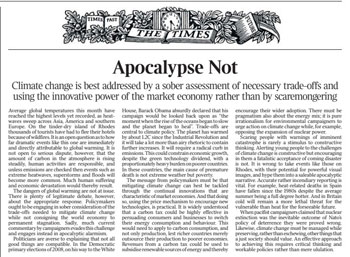
And remember, heat-related deaths in Spain have fallen since the 1980s and cold is more lethal than heat for the vulnerable in Britain. This is the sort of accurate, rather than incendiary, reporting that the leader advocates. Sounds a bit simplistic to me. Maybe they have better air conditioning in Spain these days?
The threat to the planet isn’t the effect on individuals in particular countries of a degree or so on the average temperature, it’s about weather extremes, both hot and cold, melting snowcaps, rising sea levels, floods, storms, dangers to wildlife, an upset in the balance of nature, island nations disappearing under water and much more. But the Times knows that. And so do we all.
So, I raise my glass to the i for the better headline that day; a heading that not only captured the basic facts of the events that day, but also neatly encapsulated the essence behind them with its wordplay. One of those headlines that is glaringly obvious – once someone else has written it.
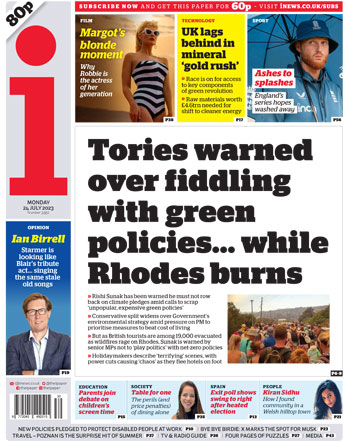
Meanwhile, if Times leader writers are still doubtful whether the Greek fires can be put down to global warming, perhaps they might like to read Tuesday’s Guardian.

Front page of the fortnight
There have been a number of excellent ones on the fires. The Guardian page above was a goodie. Ditto the i (also above) and yesterday’s Metro.

But my choice this time is this from the Mirror. Because it preceded all the “Brits in holiday terror” jingoism and focused on the real issue.
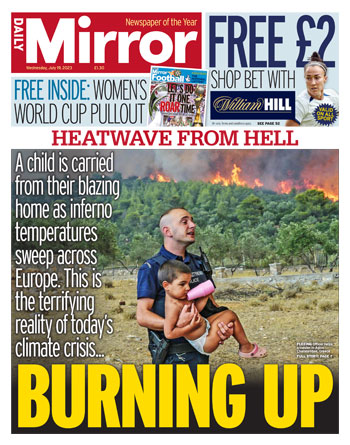
Liz Gerard’s Notebook is a fortnightly column published in the InPubWeekly newsletter. To be added to the mailing list, enter your email address here.












